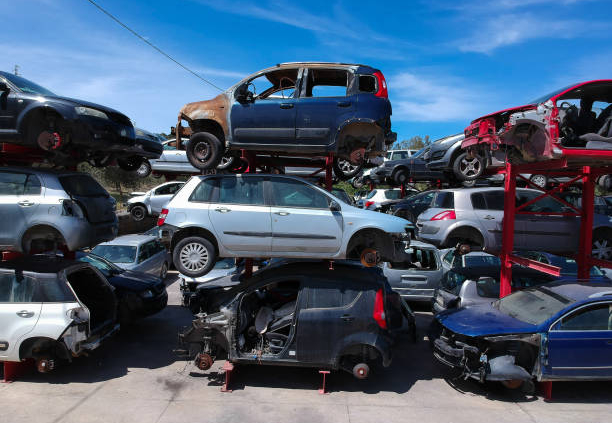Why Some People Get Rich from Scrap Cars
Scrap cars may look like useless junk, but they often hold hidden value that many people overlook. From selling recyclable metals to salvaging spare parts, Australians are finding ways to turn their old, damaged vehicles into a reliable source of income. While most car owners only see a broken machine, smart individuals and businesses have discovered how to maximise profit from vehicles that are no longer roadworthy.
The hidden value inside a scrap car
A scrap car contains several components that carry market value. The steel frame, copper wiring, catalytic converters, aluminium panels, and rubber tyres all have demand in recycling and resale markets. For example, the average passenger vehicle in Australia contains about 900 kg of steel, which can be sold to metal recyclers. Additionally, parts like alternators, engines, and gearboxes can be refurbished and resold, often making more money than the scrap metal itself. This ability to identify and separate valuable parts is the first step in turning scrap into income.
How Australians profit from scrap car recycling
In Australia, scrap car recycling generates steady revenue for individuals and businesses alike. Licensed dismantlers carefully strip cars, separating reusable parts before sending the remaining shell to metal recycling plants. Selling these components can generate anywhere from a few hundred dollars to several thousand, depending on the vehicle model and the parts’ condition. People in regional areas such as Townsville often rely on services that buy old vehicles directly. Companies offering cash for wrecked cars Townsville provide an instant solution for owners while ensuring recyclers benefit from the resale of parts and materials.
The role of scrap metal demand in Australia
Scrap cars are a consistent source of ferrous and non-ferrous metals, and Australia’s recycling industry thrives on this supply. According to the Australian Bureau of Statistics (ABS), the country produces over 2 million tonnes of ferrous scrap annually, much of it sourced from old vehicles. Export markets in Asia also fuel demand, where recycled Australian steel and aluminium are used for construction and manufacturing. This global demand allows local scrap businesses to maintain profitability while contributing to Australia’s circular economy.
| Scrap Car Component | Average Value in Australia (AUD) | Market Use Example |
|---|---|---|
| Catalytic Converter | $150 – $600 | Extracting precious metals like platinum |
| Steel (per tonne) | $250 – $400 | Construction and manufacturing |
| Aluminium Panels | $1.20 – $1.50 per kg | Automotive and aerospace industries |
| Copper Wiring | $7 – $9 per kg | Electrical applications |
| Reusable Tyres | $50 – $150 each | Resale for used car markets |
This table highlights how individual parts contribute to the overall profitability of a scrap vehicle.
How dismantlers and resellers maximise profits
Professional dismantlers don’t just rely on scrap metal. They know certain car parts can command higher prices in the used parts market. For example, engines, transmissions, and electronic control modules from vehicles less than 10 years old often sell quickly to workshops and private buyers. Dismantlers also use online platforms to reach wider audiences, selling directly to customers who need affordable parts. Local car owners also play a role—someone with an unwanted car Kirwan can sell it to dismantlers who will strip and resell the usable parts while recycling the rest responsibly.
Why some people make more money than others
The key difference between those who make significant income from scrap cars and those who don’t lies in knowledge and access. People with industry connections, proper dismantling equipment, and understanding of market trends can consistently extract more value. They know which car models have parts in high demand, how to store components safely, and which recycling facilities offer better rates. On the other hand, car owners who simply sell their vehicles to the nearest yard without research may only earn a fraction of the potential value.
Environmental and financial benefits combined
Scrap cars are not only a source of income but also an environmentally responsible choice. Recycling old vehicles reduces landfill waste, lowers greenhouse gas emissions, and conserves resources by reusing metals instead of mining new ones. In Australia, more than 85% of a typical vehicle can be recycled, making it one of the most sustainable disposal methods. People who engage in this process often benefit financially while also contributing to a cleaner environment.
Why Townsville Cash 4 Cars stands out
Among the many services in Queensland, Townsville Cash 4 Cars provides one of the most reliable solutions for vehicle owners. The company offers fast pickup, competitive payouts, and ensures cars are recycled through environmentally safe methods. For owners who may not know how to profit from their damaged or unwanted vehicles, partnering with a professional service like this ensures they receive fair value without the hassle of dismantling themselves. This combination of convenience and ethical recycling makes them a trusted choice in the local market.
Final thoughts
Scrap cars may look worthless, but with the right knowledge, connections, and services, they can generate real income. Some people get rich from scrap cars because they understand where the true value lies—in metals, parts, and recycling markets. For everyday Australians, selling an old vehicle to a licensed dismantler or removal service can unlock hidden profit while also supporting environmental sustainability.
Explore more insights on sustainable car disposal in our blog section.



Leave a Reply
Want to join the discussion?Feel free to contribute!